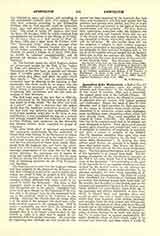

Apostolicae Sedis Moderations, a Bull of Pius IX (1846-78) which regulates anew the system of censures and reservations in the Catholic Church. It was issued October 12, 1869, and is practically the present penal code of the Catholic Church. Although its Founder is divine, the Church is composed of members who are human, with human passions and weaknesses. Hence the need of laws for their direction, and of legal penalties for their correction. In the course of centuries these penal statutes accumulated to an enormous extent, some confirming, some modifying, some abrogating others which had been already made. They were simplified by the Council of Trent (1545-63). But afterwards new laws had to be enacted, some had to be altered, and some abrogated as before. Thus these penal statutes became again numerous and complicated, and a cause of confusion to canonists, of perplexity to moralists, and often a source of scruples to the faithful. Pius IX, therefore, simplified them again after three hundred years of accumulation, by the Bull “Apostolicie Sedis Moderationi”. In quoting the more solemn papal decrees, the practice is to entitle them from their initial words. (See Bulls and Briefs.) The words of this title are the first words of the document. The best general description that can be given of this legislation is an extract from itself. The following translation of the introductory passages of the Bull is not quite literal, but it is faithful to the sense of the document: “It is according to the spirit of the Apostolic See to so regulate whatever has been decreed by the ancient canons for the salutary discipline of the faithful, as to make provision by its supreme authority for their needs according to altered times and circumstances. We have for a long time considered the Ecclesiastical Censures, which, per modum latae sententiae ipsoque facto incurrendoe, for the security and discipline of the Church, and for the restraint and correction of licence in the wicked, were wisely decreed and promulgated, have from age to age gradually and greatly multiplied, so that some, owing to altered times and customs, have even ceased to serve the end or answer the occasion for which they were imposed; while doubts, anxieties, and scruples, have for that reason not infrequently troubled the consciences of those who have the cure of souls and of the faithful generally. In Our desire to meet those difficulties, We ordered a thorough revision of those censures to be made and placed before Us, in order that, on mature consideration, We might determine those of them which ought to be retained and observed, and those which it would be well to alter or abrogate. Such revision having been made, having taken counsel with Our Venerable Brothers the Cardinals General Inquisitors in matters of faith for the Universal Church, and after a long and careful consideration, We, of Our own accord, with full knowledge, mature deliberation, and in the fullness of Our Apostolic power, decree by this permanent Constitution that of all Censures, either of Excommunication, Supervision, or Interdict, of any kind soever, which per modum lake sententiae ipsoque facto incurrendoe have been hitherto imposed, those only which We insert in this Constitution and in that manner in which We insert them, are to be in force in future; and We also declare that these have their force, not merely from the authority of the ancient canons coinciding with this Our Constitution, but also derive their force altogether from this Our Constitution, just as if they had been for the first time published in it.”
According to those introductory passages, the Bull “Apostolicae Sedis” left all canonical penalties and impediments (deposition, degradation, deprivation of benefice, irregularity, etc.) as they were before, except those with which it expressly deals. And it deals expressly with those penalties only, the direct ‘purpose of which is the reformation rather than the punishment of the person on whom they are inflicted, namely, censures (excommunication, suspension, and interdict). Moreover, it deals only with a certain class of censures. For clearness it is well to observe that a censure may be so attached to the violation of a law that the lawbreaker incurs the censure in the very act of breaking the law, and a censure as decreed binds at once the conscience of the lawbreaker without the process of a trial, or the formality of a judicial sentence. In other words, the law has already pronounced sentence the moment the person who breaks the law has completed the act of consciously breaking it; for which reason, censures thus decreed are said to be decreed per modum latae sententiae ipsoque facto incurrendoe; i.e. censures of sentence pronounced and incurred by the act of breaking the law. But, on the other hand, a censure may be so attached to the breaking of a law that the lawbreaker does not incur the censure until, after a legal process, it is formally imposed by a judicial sentence, for which reason censures thus decreed are called ferendoe sententioe, i.e. censures of sentence to be pronounced. Censures of this latter kind were left out by this Bull, and remain just as they were before, together with those penalties above referred to, the direct purpose of which is punishment. The Bull “Apostoliem Sedis Moderationi” deals, therefore, exclusively with censures latae sententiae. Now, how has it altered or abrogated them? It abrogated all except those expressly inserted in it. Those which are inserted in it, whether old ones revived or retained, or new ones enacted, bind throughout the Catholic Church, all customs of any kind to the contrary notwithstanding, because this Bull became the source of the binding power of all and each of them, even of such as might have gone into disuse anywhere or everywhere. The censures retained are inserted in the Bull in two ways: First, it makes a list of a certain number of them; Second, it inserts in a general way all those which the Council of Trent either newly enacted, or so adopted from older canons as to make them its own; not those, therefore, which the Council of Trent merely confirmed, or simply adopted from older canons.
We have so far determined those censures which are in force throughout the Bull “Apostolicae Sedis”, and which may be taken as the common law of the Church in that sphere of its legislation. But one who has incurred a censure can be freed from it only through absolution by competent jurisdiction. Although a censure is merely a medicinal penalty, the chief purpose of which is the reformation of the person who has incurred it, yet it does not cease of itself merely by one’s reformation. It has to be taken away by the power that inflicts it. It remains, therefore, to consider briefly those of the Bull “A stolicae Sedis” with respect to the power by which one may be absolved from any of them. They are classified in that respect by Pius IX in the Bull itself. Any priest who has jurisdiction to absolve from sin can also absolve from censures, unless a censure be reserved, as a sin might be reserved; and some of the censures named in the Bull “Apostolicae Sedis” are not reserved. It may be well to observe here that the absolution from sin and absolution from censure are acts of jurisdiction in different tribunals; the former belongs to jurisdiction in foro interno, i.e. in the Sacrament of Penance; the latter belongs to jurisdiction in foro externo, i.e. without and outside the Sacrament of Penance. Some censures of the “Apostolicae Sedis” are reserved to bishops; so that bishops, within their own jurisdiction, or one specially delegated by them, can absolve from censures so reserved. Some are reserved to the Pope, so that not even a bishop can absolve from these without a delegation from the Pope. Finally, the Bull “Apostolicae Sedis” gives a list of twelve censures which are reserved in a special manner (speciali modo) to the Pope; so that to absolve from any of these, even a bishop requires a special delegation, in which these are specifically named. These twelve censures, except the one numbered X, were taken from the Bull “In Coena Domini“, and consequently, since the publication of the “Apostolicae Sedis”, the Bull “In Coena Domini” (so called because from 1364 to 1770 it was annually published at Rome, and since 1567 elsewhere, on Holy Thursday) ceased to be, except as an historical document. Of these eleven canonical offenses, five refer to attacks on the foundation of the Church; that is, on its faith and constitution. Three refer to attacks on the power of the Church and on the free exercise of that power. The other three refer to attacks on the spiritual or temporal treasures of the Church. A few censures have been enacted since the Bull “Apostolicae Sedis” was published. These are usually mentioned and interpreted in the published commentaries on that Bull. The commentary by Avanzirti and Pennacchi (Rome, 1883), the learned editors of the “Acta Sanctae Sedis“, is the most complete. That issued (Prato, 1894) by the late Cardinal D’Annibale, however, is of all others to be recommended for conciseness and accuracy combined.
See Ecclesiastical Censures. Excommunication. Interdict. Suspension.
M. O’RIORDAN


